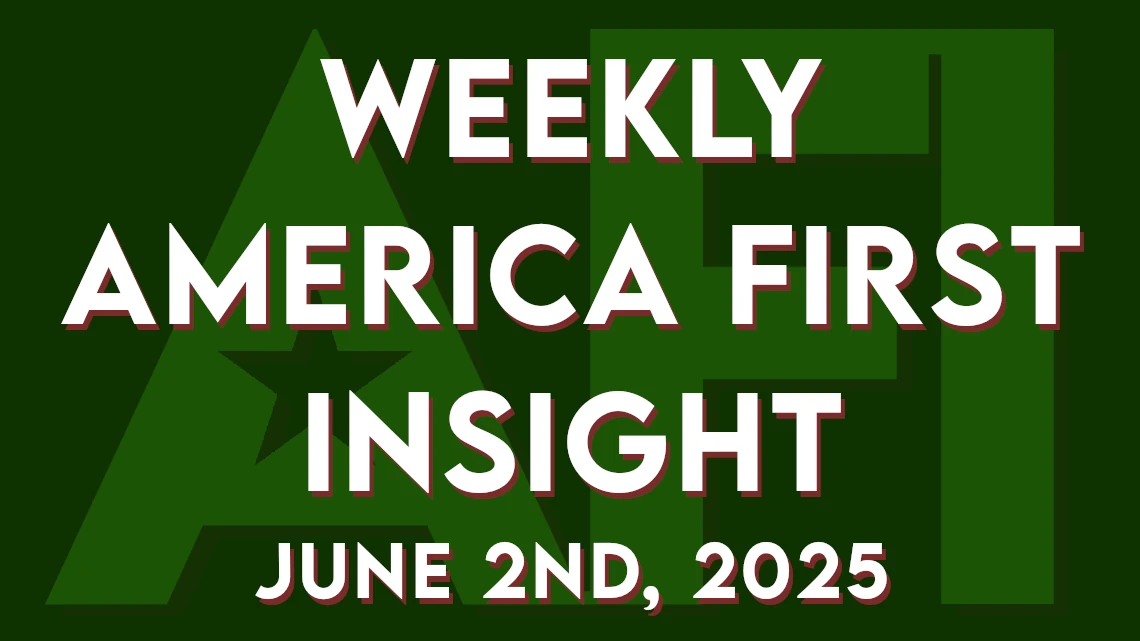
Published on
Written by Mark Christian
Welcome to Your Weekly America First Insight for June 2, 2025, where we analyze the latest political shifts, economic developments, and electoral updates shaping the America First agenda. This week, we cover Democratic strategies, robust economic growth, immigration enforcement, cultural shifts, and early 2028 presidential race dynamics.
In political maneuvering, Senator Elissa Slotkin proposed that Democrats form a "Shadow Cabinet" to counter President Trump’s agenda, a concept rooted in European parliamentary systems. However, suggestions for this cabinet, including New York Attorney General Letitia James as Shadow Attorney General, have been criticized as impractical and disconnected from mainstream voters. This move underscores the Democratic Party’s ongoing struggle to present a coherent alternative, appearing overly focused on niche, activist-driven narratives.
Economically, the Trump administration’s policies are gaining traction. Forecasts for Q2 2025 GDP growth range from 2% to 4%, exceeding expectations. The American Consumer Confidence Index soared to 98, surpassing predictions of 87. Real wages grew 0.8% in April alone and 2.5% since January 2025, outpacing the 2.1% year-on-year inflation rate—the first time since 2020 that Americans’ purchasing power has consistently risen, signaling a strengthening economy under Trump’s leadership.
Immigration enforcement saw significant action this week. In Massachusetts, 1,400 undocumented immigrants with criminal records were arrested on June 2. In New York, federal agents investigated Representative Jerrold Nadler’s office following a tip about harboring an anti-ICE rioter, briefly detaining an aide. In San Diego, a city council member controversially labeled ICE agents as “terrorists” during operations to detain dangerous criminals, highlighting tensions over immigration policy.
Culturally, the observance of Pride Month has notably diminished. The FBI and most federal agencies will not participate in Pride Month activities, and corporate sponsorship for Pride events has waned, reducing the month’s public prominence compared to previous years. This shift reflects a broader recalibration of cultural priorities under the current administration.
In electoral developments, President Trump signaled support for Congressman Daniel Meuser in a potential 2026 Pennsylvania gubernatorial run. Meuser could mount a stronger campaign than the 2022 GOP effort, potentially opening an R+38 House seat for a new America First candidate. However, Meuser’s D rating on our America First scorecard suggests he may not fully align with the movement’s priorities.
Trump also detailed his No Tax on Social Security plan, proposing a rebate or tax credit to ensure most, if not all, Social Security recipients pay no taxes on their benefits. This policy aims to bolster financial security for retirees, reinforcing Trump’s commitment to the working class.
Looking ahead to 2028, Minnesota Governor Tim Walz met with South Carolina Congressman Jim Clyburn, a key Democratic kingmaker, fueling speculation about Walz’s presidential ambitions. Walz appears to be positioning himself as a middle-class-focused Democrat. However, recent NBC/CNBC polling shows a seismic shift in voter perception: in 2016, Democrats were seen as the middle-class party by a 17-point margin, but today, voters view the parties as equally representative of working-class interests, signaling challenges for Democrats in reclaiming this demographic.
Thank you for reading Your Weekly America First Insight. Join us next Monday for members or Tuesday for non-members as we continue to track the policies and trends shaping America’s future.
Related Articles
About the Author
Mark Christian is a writer and Founder of America First Insight. Follow him on X (formerly Twitter).
Stay Updated
Get the latest updates from America First Insight. Subscribe to our newsletter for more political news and insights!